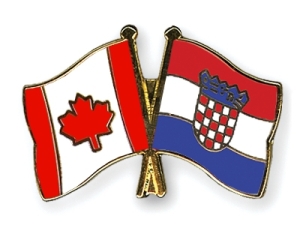The following post is the seventh in a series that features collaboration between the Acadiensis blog and the students in Jerry Bannister’s undergraduate and graduate Canadian Studies and History classes at Dalhousie University.
by Stefanie Mracic
When growing up Canadian born with an immigrant grandfather from the former Yugoslavia there has always been a push for knowing my heritage and background of Serbia and Croatia. At countless family gatherings my grandfather would arrive with some type of document or memory about his native country. I never fully understood his passion for a country he left until I became a Canadian studies double major and found myself eager to look back on the documents and read my family’s history.

Canadian and Croatian Flags
This past summer when I was home from university he came over with a binder full of pictures and maps about his village, his time in refugee camps and how he was involved in World War Two. Along with these he had more recent pieces, one of which was an article he wrote in The Markham Economist & Sun in December 2009 titled “Don’t forget your mother tongue”. This was a response piece under letters to the editor from another article written called “Learn English, leave old country behind”.
My grandfather’s article discussed his experiences in his birthplace as a young boy to a young adult, working and going to school full time (Mracic, 6). He then addressed coming to Canada and adapting to his new life while not forgetting where he came from (Mracic, 6). Some parts of his article speak to my experiences in Canada; from the jobs he got when he first came here he said, “This is how I learned my first English phrase ‘I am sorry’”(Mracic, 6). This phrase is one I personally chuckled at, for it speaks volumes about how Canadians are seen as apologetic. There are times I find myself apologizing for things I am not in the wrong with or walking into inanimate objects to find myself saying “I’m sorry” that I bumped into it.
My grandfather continues his article talking about how he learned English the hard way, in the workplace (Mracic, 6). Reflecting upon this statement makes me realize how often I take for granted already knowing the mother tongue of Canada, and not having a worry about how to communicate my thoughts and understanding to my peers and coworkers.
With language in mind, my grandfather mentions in his article that he regrets not teaching his mother tongue to my dad, uncle, cousins and myself (Mracic, 6). I can recall the times my family would go to an orthodox Christmas service where the priest was speaking in Serbian and my brother, cousins and I were completely lost but wished we had some understanding of what was going on since it was a part of our heritage. Although I never learned the language, I still have an appreciation for the culture because the experiences made me more informed about the community.
In my grandfather’s article there was a note he made on the copy given to me that is worth mentioning. In this section he is writing about how he never embraced the “communist regime” although the editor changed those words to “community regime” (Mracic, 6). The word communist does bring a negative connotation along with it and from that I am interested in the thoughts that were going through the editor’s mind while reading and then changing the term.
In the article my grandfather writes about coming to Canada with only five dollars in his pocket and less than that when he got to Toronto (Mracic, 6). After reading this, and knowing the life he has built in Canada, it reminds me of how this country has given opportunities to so many immigrants. Those born in Canada with no immediate history of immigrant family members do not realize how much of an impact our country has when presenting a new beginning to those coming to Canada. My grandmother also came to Canada from the former Yugoslavia and met my grandfather when she moved here. I have this nation to thank for giving a chance to my grandparents to start a new life. Without Canada as a place of refuge for my grandparents there is the possibility that I would not have been born.
It is important to remember where you came from and how you have got to the place you are. Being Canadian-born I have to remind myself that, although my passport says Canadian, I still have other countries that are a part of my heritage. When reflecting on the article written by my grandfather I can see it is important to him to remember where he came from and what he went through to get to Canada. People say that history is all in the past and it is hard to relate to. However, if we take the time to dig into our own family histories, we might be surprised by what we find. History does not need to be boring; if you find something close to your heart it will open up a new desire to learning about the past.
Stefanie Mracic is an undergraduate Canadian studies student at Dalhousie University.
Works Cited
Mracic, Branko. “Don’t Forget Your Mother Tongue.” The Markham Economist & Sun. 12 December 2009: 6. Print.




Pingback: Canadian History Roundup – Week of June 25, 2017 | Unwritten Histories